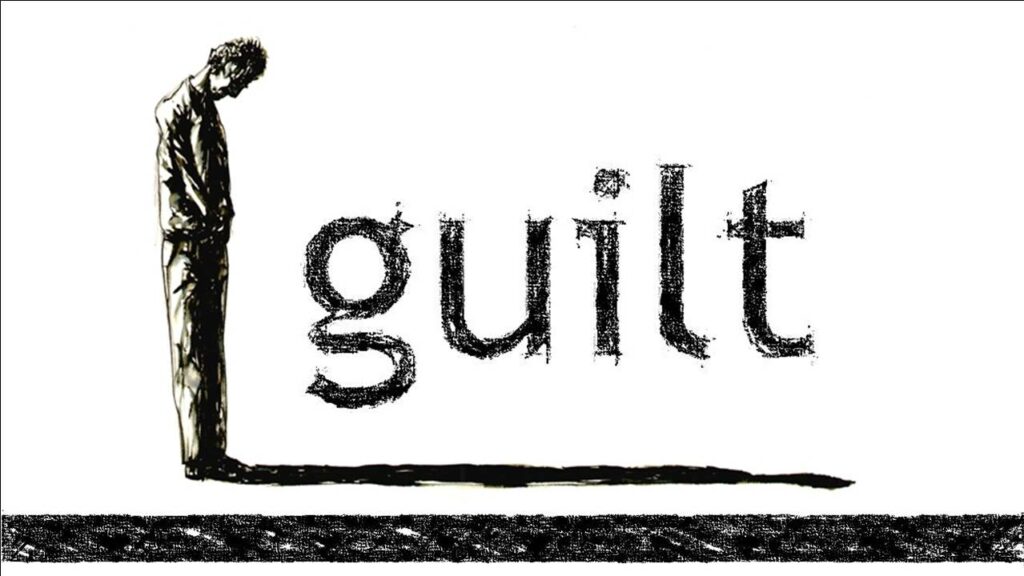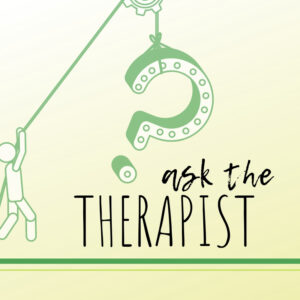“Guilt is a feeling or state of mind that occurs when one believes one has done something wrong.” It can be an extremely powerful emotion, and it’s not always easy to get rid of. In this blog post, we’re going to talk about how guilt works and what causes it. We’ll also discuss some things you can do to stop feeling guilty — or at least reduce the amount that you feel!
Contents
- 1 What Is Guilt?
- 1.1 Guilt Psychology
- 1.2 What Triggers Guilt?
- 1.3 Types
- 1.4 How Does Guilt Feel?
- 1.5 Causes
- 1.6 Sources That Contribute To Guilt
- 1.7 Effects
- 1.8 Difference between Shame And Guilt
- 1.9 Is Guilt A Good Thing?
- 1.10 Coping With Guilt
- 1.11 How to Stop Feeling Guilty?
- 1.12 Therapy For Guilt
- 1.13 Self Compassion For Guilt
- 2 Conclusion
What Is Guilt?
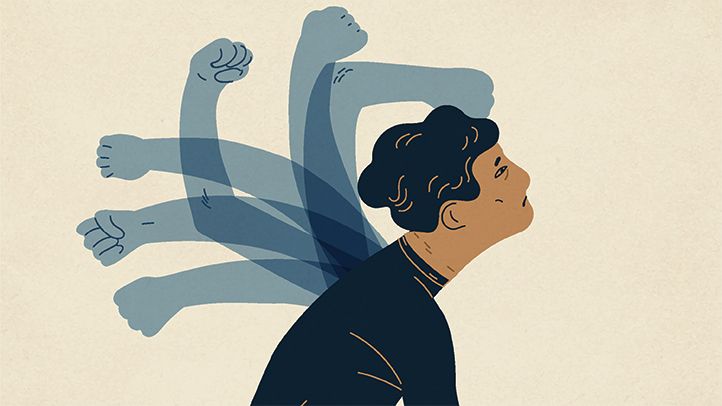
Guilt is a feeling or state of mind that occurs when one believes one has done something wrong. It’s usually accompanied by feelings of shame, regret, and self-hatred. Guilt can be very powerful, and it can often be difficult to get rid of.
Guilt Psychology
So why do we feel guilty? Guilt is a very complex emotion, and there’s no one answer to that question. Some experts believe that guilt evolved as a way to help us survive in social groups. Others believe that it’s related to our feelings of morality and ethics.
Whatever the case may be, guilt plays an important role in our psychology. It can motivate us to make amends for our wrongs, prevent us from repeating harmful behaviors, and help us maintain healthy relationships. Some experts believe that guilt is a good thing.
What Triggers Guilt?

Not all guilty feelings are created equal. In order to deal with guilt effectively, it’s important to know what causes them and how they work. Some of the most common triggers include:
- Being aware of your actions but feeling powerless over them
- Believing in a moral code or having a sense of right and wrong
- Reflecting on yourself as being “good” or “bad”
- Feeling responsible for causing harm to others
There can be other factors involved too — such as religion, family life, parenting styles, etc. In addition to these internal factors, there are also external. These might involve things like social pressure, the expectations of others, or even media messages.
Types
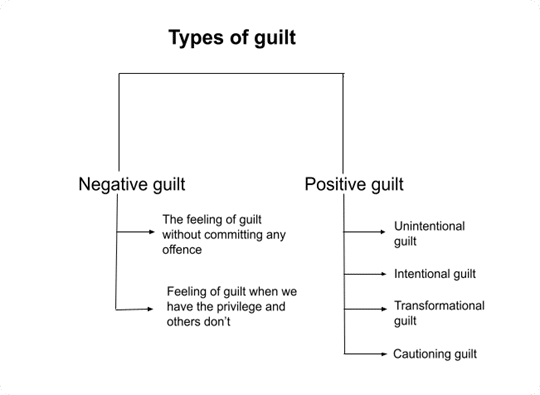
There are different types of guilt, and they can vary in terms of intensity and duration. Some common types include:
- Survivor’s guilt: It is felt by people who have survived a traumatic event while others have died. It often includes feelings of self-blame and regrets for being alive.
- Reactionary guilt: It is caused by things we do that we believe go against our values or beliefs. For example, if you cheat on your partner, you might feel guilty because you’re not the kind of person who cheats.
- Self-imposed guilt: It is often linked to perfectionism and occurs when we set unreasonably high standards for ourselves and then fail to meet them.
- Situational guilt: It is caused by specific situations or events, such as feeling guilty about taking a vacation when others are struggling financially.
- Constructive guilt: It is healthy and can be helpful in terms of motivating us to make positive changes. For example, if you feel guilty about not exercising enough, that might motivate you to start working out regularly.
- Destructive guilt: It is harmful and can lead to feelings of shame and self-hatred. It often results from exaggerated or irrational thoughts, such as believing that we’re “bad” people because we made a mistake.
How Does Guilt Feel?
The experience of guilt varies from person to person. However, some common symptoms include:
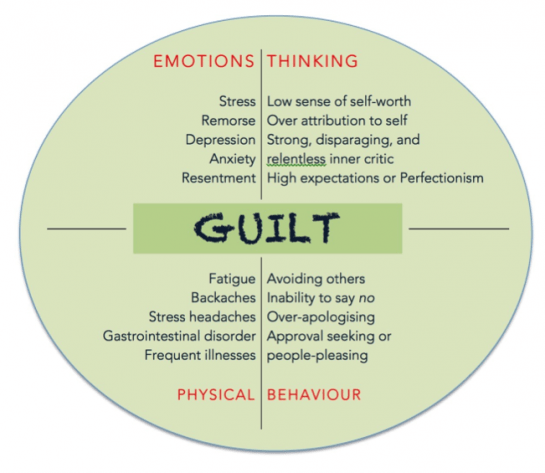
- Feelings of shame, regret, and self-hatred
- Anxiety
- Low self-esteem
- Nausea or stomach aches
- Headaches or migraines
- Insomnia or sleep disturbances
- Lack of motivation
- Depression
Causes
Many different things can cause guilt. Some common causes include:
- Making mistakes
- Hurting someone else’s feelings
- Failing to meet someone’s expectations
- Doing something you know is wrong
Sources That Contribute To Guilt
There are many potential sources of guilt, and some can be more impactful than others. Some common contributors include:
- Family life: Parenting styles and relationships with family members can have a big impact on our sense of guilt.
- Religious beliefs: If you believe in concepts like sin or original sin, your religion might contribute to feelings of guilt over things that are completely normal (like masturbation). In some cases, these messages go so deep they become subconscious — which allows them to affect us even if we don’t fully understand why.
- Media messages: The media bombards us with images and messages that portray certain behaviors as “good” or “bad.” So the next time you see an ad for diet pills, it’s likely going to make you feel guilty about overeating — regardless of whether it has anything at all to do with food.
- Social pressure/expectations: Our society places a lot of value on ideals like perfection and success. This can cause us to feel guilty about not meeting others’ standards, even when we’re doing pretty well in our own lives.
- Miscarriages or other traumatic events (deaths or illnesses): These types of experiences are often talked about as “burdens” that people carry around with them — which contributes to feelings of guilt even if it feels irrational.
Effects
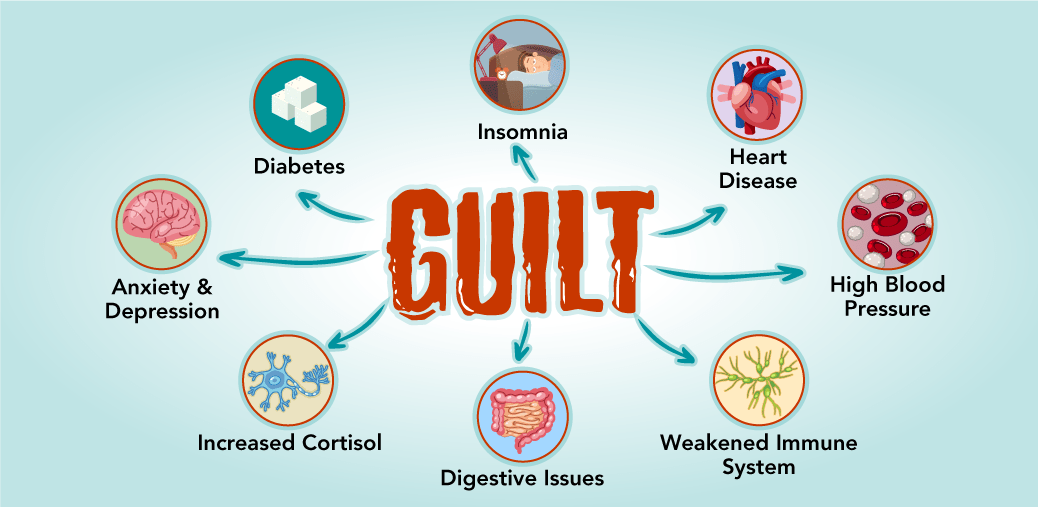
Guilt can have several negative effects on our lives, both mentally and physically. Some common consequences include:
- Problems with relationships: Guilt can often lead to feelings of isolation and loneliness, as well as strained relationships with friends, family members, and romantic partners.
- Self-destructive behaviors: People who feel guilty a lot are more likely to engage in self-destructive behaviors like drug abuse or binge eating.
- Poor mental health: Guilt is often associated with conditions like depression and anxiety. It can also lead to low self-esteem and problems with motivation.
- Physical health problems: This feeling has been linked to things like headaches, stomachaches, insomnia, and even heart disease.
Difference between Shame And Guilt
Shame and guilt are two different emotions, but they’re often confused with each other. Shame is the feeling that we’re “bad” people, while guilt is the feeling that we’ve done something bad.
Shame is often associated with more global beliefs about the self, like “I’m a terrible person” or “Everyone thinks I’m worthless.”
Guilt can be related to specific actions or behaviors. For example, you might feel guilty after yelling at your friend — even if you don’t think of yourself as an inherently bad person.
Is Guilt A Good Thing?
Being able to experience guilt is a good thing. It’s an emotional signal that lets us know when we’ve done something wrong, so we can take steps to correct our behavior and repair any damage we might have caused.
However, feeling guilty about every little mistake you make isn’t necessarily healthy — especially if it leads to self-destructive behaviors or strained relationships with others. In these cases, learning how to let go of the feeling (and the shame that often comes along with it) may be beneficial for everyone involved.
Coping With Guilt

While guilt can be a helpful emotion, it’s often associated with negative feelings like shame. These types of emotions are important to acknowledge — but they’re not always easy to deal with on your own.
If you frequently feel guilty or ashamed about things that aren’t productive for you (or the people around you), consider seeking professional help from a therapist. They can provide valuable insight into what might be causing these thoughts and offer guidance in developing healthier ways of coping.
How to Stop Feeling Guilty?
So now that we know a little bit about what guilt is and what causes it, let’s talk about some ways to stop feeling guilty. Here are a few tips:
- Acknowledge your feelings. The first step in dealing with guilt is acknowledging that you feel it. Don’t try to push down your feelings or ignore them — that will only make them worse in the long run.
- Talk to someone. It can be really helpful to talk to someone else about your guilty feelings. This could be a friend, family member, therapist, or any other support system. Talking about your emotions can help you process them better.
- Make amends. If you’ve done something wrong, try to make amends as best you can. This may not always be possible, but it can help reduce the guilt you feel.
- Think about the consequences. When you’re feeling guilty, it’s important to think about the consequences of your actions. What will happen if you continue to feel guilty? Will it hurt yourself or others? Will it prevent you from living a fulfilling life?
These are just a few tips for dealing with guilt. Remember that everyone experiences guilt in different ways, so what works for one person might not work for another. If you’re struggling with overwhelming feelings of guilt, please seek professional help.”
Therapy For Guilt
Therapy can be a great way to work through your feelings of guilt. If you’re finding that your guilt is negatively impacting your life, therapy can help you understand why you feel guilty and how to manage those feelings.
Therapists can guide how to cope with guilt healthily and how to repair any damage caused by your actions. They can also offer support when it feels like being guilty is too much to handle on your own.
- Cognitive Behavioral Therapy (CBT) can help you identify and change the thoughts and beliefs that contribute to your feelings of guilt.
- Psychodynamic therapy can help you explore the root causes and address any underlying issues that might be causing it.
- Family systems therapy can help you understand how your family dynamics might be contributing to your guilt.
If you’re feeling guilty about something, please don’t hesitate to reach out for help. There are many resources available to you, and there is no shame in seeking assistance from a professional. It can be a difficult emotion to deal with on your own, but with the right tools, you can manage it effectively.”
Self Compassion For Guilt

Self-compassion can be a great tool to help reduce feelings of guilt.
Start by practicing self-kindness and being gentle with yourself when you’re feeling guilty. This means accepting your own mistakes, flaws, and shortcomings without judgment or harsh criticism.
Instead of beating yourself up for making bad choices, try taking an active role in getting through this difficult time and learning from the experience so that it won’t happen again (if applicable). Allow everyone involved to make their own decisions about how they feel — don’t pressure them into doing things because you want them to forgive you.
Let go of any expectations you might have for others or what they should do after something goes wrong — instead, focus on forgiving yourself and giving yourself space if that’s what you need.
Remember that guilt is a normal and natural feeling, but it’s not always helpful or healthy. If your feelings of guilt are overwhelming and impacting your life, please reach out for help.”
Conclusion
Guilt is a powerful emotion. Advertisers can sell products or services that you might not need. You might feel guilty if you don’t buy them. We have given you some information on how guilt works. You can turn it off for your customers so they will make more informed decisions in the future. But don’t worry! With our help, we know you won’t have any trouble avoiding these techniques and building trust instead.
If you are looking for affordable Online Counseling MantraCare can help: Book a trial therapy session
